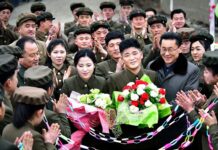North Korea has embarked on a rehabilitation of the Chosun (North Korea) Workers’ Party’s authority, meaning a return to party-centered politics from military-oriented politics, various inside sources suggest. The move could be related Kim Jong Il’s choice of successor.
In late February, a number of sources told the Daily NK through telephone interviews that instructions came down from the Party to each province on February 1st to “pay more respect to the local party apparatus than to the armed forces.”
Various sources said, “The rumours say that the instructions are intended for everyone (resident of Hoeryong)”, “Foreign currency-earning workers were given a mass lecture on this subject in mid-February (resident of Chongjin)”, and “People welcomed the command, hoping for less harassment from the army (resident of Hyesan)”.
The change could mean that Kim Jong Il, who has emphasized a “military-first policy” for the 10 years since the famine of the mid-1990s, is shifting ruling power from the military into Party-concentrated control.
A North Korean specialist and defector, speaking on condition of anonymity, said “If the instruction is not bogus, Kim Jong Il could be thinking that ‘it is the time for a power-shift from the military to the party.’”
Last October, Kim Jong Il reappointed his brother-in-law and closest advisor, Jang Sung Taek, to the Director of the Administration Department, which has the responsibility for the National Security Agency, the People’s Safety Agency, and the Prosecutors’ Office. More recently, the Guidance Department undertook a large-scale inspection of the United Front Department, which signals an attempt to strengthen the Party.
The Guidance Department of the Party is the department tasked with leading and inspecting the Party apparatus. It also resides at the core of the North Korean power structure and is under Kim Jong Il’s direct control, so its involvement demonstrates the gravity of this investigation.
Sohn Kwang Ju, the chief editor of Daily NK and an expert on Kim Jong Il, suggested that, “Kim Jong Il, thinking that North Korea has already achieved military strength through the possession of nuclear weapons, is now starting to reconstruct the Party-centered order and revive the Party’s authority.”
“Recently, Kim Jong Il has been deviating away from nuclear-related issues, including the nuclear program declaration, through inviting the New York Philharmonic Orchestra to Pyongyang. In this year of the Beijing Olympics, he might pursue stability through a ‘peace program’ to attract Chinese aid and enlarged contact with the Americans as well as by rebuilding the Party authority inside the country,” Sohn added.
Kim Young Hwan, a member of editorial committee of the Zeitgeist, anticipated that “The inspection could be related to the succession issue, although there is not information availalbe to make a prediction.”
Kim said, “If a successor to Kim Jong Il rises through the ranks, it is inevitable that he would do this with the Party or Guidance Department’s blessing. Whoever the successor is, he first needs to build his own authority and charisma through adopting that of the Party or the Guidance Department. He could have initiated this, or Kim Jong Il might be doing this for the preliminary successor’s own sake.”
Hwang Jang Yop, President of the Committee for the Democratization of North Korea and the former North Korean Foreign Secretary, gave a similar analysis. According to him, “Kim Jong Il, sooner or later, will strengthen the Party’s authority, especially that of the Guidance Department because the Vice-Director position of the Guidance Department should eventually be taken by one of Kim’s sons.”
Nevertheless, many experts expect difficulty for Kim Jong Il in his effort to strengthen the authority of the Party.
Han Ki Hong, the president of the Network for North Korean Democracy and Human Rights, said that “Kim Jong Il has been running his country under the abnormal system of the Military-First policy for over a decade. Throughout that time, the Party’s authority totally collapsed and the armed forces’ power and authority has increased beyond control, and this is irrevocable.”
The anonymous North Korean expert and a defector anticipated, “To empower the Party will not be as easy as Kim Jong Il might think, since the local party organizations have been disintegrating for too long.”




















